Poetry
Poetry

Poetic Intention
This is the first English-language translation of Poetic Intention, Glissant’s classic meditation on poetry and art. In this wide-ranging book, Glissant discusses poets, including Stéphane Mallarmé and Saint-John Perse, and visual artists, such as the Surrealist painters Matta and Wilfredo Lam, arguing for the importance of the global position of art. He states that a poem, in its intention, must never deny the “way of the world.” Capacious, inventive, and unique, Glissant’s Poetic Intention creates a new landscape for understanding the relationship between aesthetics and politics.
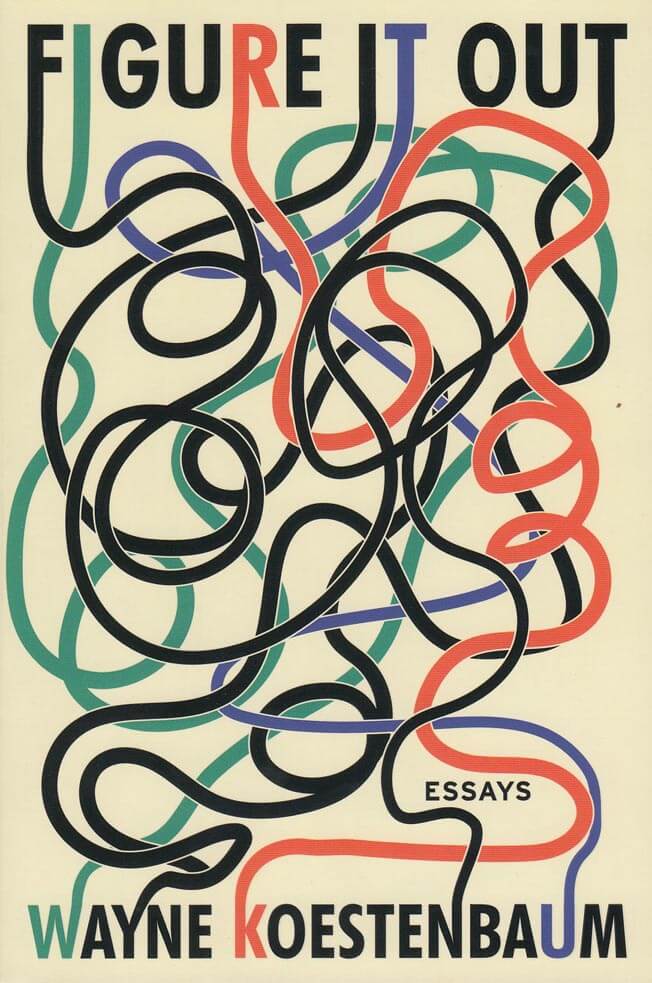
Figure It Out
'Toward what goal do I aspire, ever, but collision? Always accident, concussion, bodies butting together. By collision I also mean metaphor and metonymy: operations of slide and slip and transfuse.' In his new nonfiction collection, poet, artist, critic, novelist, and performer Wayne Koestenbaum enacts twenty-six ecstatic collisions between his mind and the world. A subway passenger's leather bracelet prompts musings on the German word for stranger; Montaigne leads to the memory of a fourth-grade friend's stinky feet.
Koestenbaum dreams about a hand job from John Ashbery, swims next to Nicole Kidman, reclaims Robert Rauschenberg's squeegee, and apotheosizes Marguerite Duras as a destroyer of sentences. He directly proposes assignments to readers: Buy a one-dollar cactus, and start anthropomorphizing it. Call it Sabrina. Describe an ungenerous or unkind act you have committed. Find in every orgasm an encyclopedic richness. Reimagine doing the laundry as having an orgasm, and reinterpret orgasm as not a tiny experience, temporally limited, occurring in a single human body, but as an experience that somehow touches on all of human history. Figure It Out is both a guidebook for, and the embodiment of, the practices of pleasure, attentiveness, art, and play.
May 2020

Toxicon and Arachne
In Toxicon & Arachne, McSweeney allows the lyric to course through her like a toxin, producing a quiver of lyrics like poisoned arrows. Toxicon was written in anticipation of the birth of McSweeney's daughter, Arachne. But when Arachne was born sick, lived briefly, and then died, McSweeney unexpectedly endured a second inundation of lyricism, which would become the poems in Arachne, this time spun with grief. Toxicon & Arachne is the culmination of eight years of engagement with lyric under a regime of global and personal catastrophes.

Slow Tongue
Slow Tongue is the debut writing and poetry collection from Olivia Douglass. A verse-essay/lyric essay hybrid examining race, sexuality and the relationship between Black women artists. 'Slow Tongue' is a response to the writings of M. NourbeSe Philips 'She Tries Her Tongue Her Silence Softly Breaks', and works to continue the decolonisation of language and imagery.
Each piece may be taken individually, but it is through looking at their positioning amongst each other that something more comprehensive, provocative and challenging comes together.
Written and designed by Olivia Douglass
Cover illustration by Jack Tongeman

Dyke (geology)
Through intertwined threads of autofiction, lyric science writing, and the tale of a newly queer Hawaiian volcano, Sabrina Imbler delivers a coming out story on a geological time scale. This is a small book that tackles large, wholly human questions—what it means to live and date under white supremacy, to never know if one is loved or fetishized, how to navigate fierce desires and tectonic heartbreak through the rise and eventual eruption of a first queer love.
Sabrina Imber's DYKE (GEOLOGY) is not only gorgeous, it is wildly transformative. It contains sentences that mimic the Earth itself: craggy, pitted, alive. There is so much movement, a momentum that sweeps readers along sentence by sentence. The structures Imbler builds are deeply affecting, deeply moving. The heart of it sits exposed, bare and beating, pulsing and insistent. This writing is very queer, very loving, very painful, very poignant. It is revolutionary work."—Kristen Arnett
"Imbler queers the history of the world here—a thrilling summer romance set to geological time, unlike any I know, spanning the globe and the history of humanity and the space between two dyke hearts. Play in the waves of this mind and emerge renewed."—Alexander Chee
Sabrina Imbler is a half-Chinese writer and dyke based in Brooklyn. She is a staff writer for Atlas Obscura and the recipient of fellowships from Jack Jones Literary Arts, the Asian American Writer's Workshop, and Paragraph NY. Sabrina wrote the monthly "My Life in Sea Creatures" column at Catapult and her essay collection How Far the Light Reaches is forthcoming from Little, Brown in 2021.
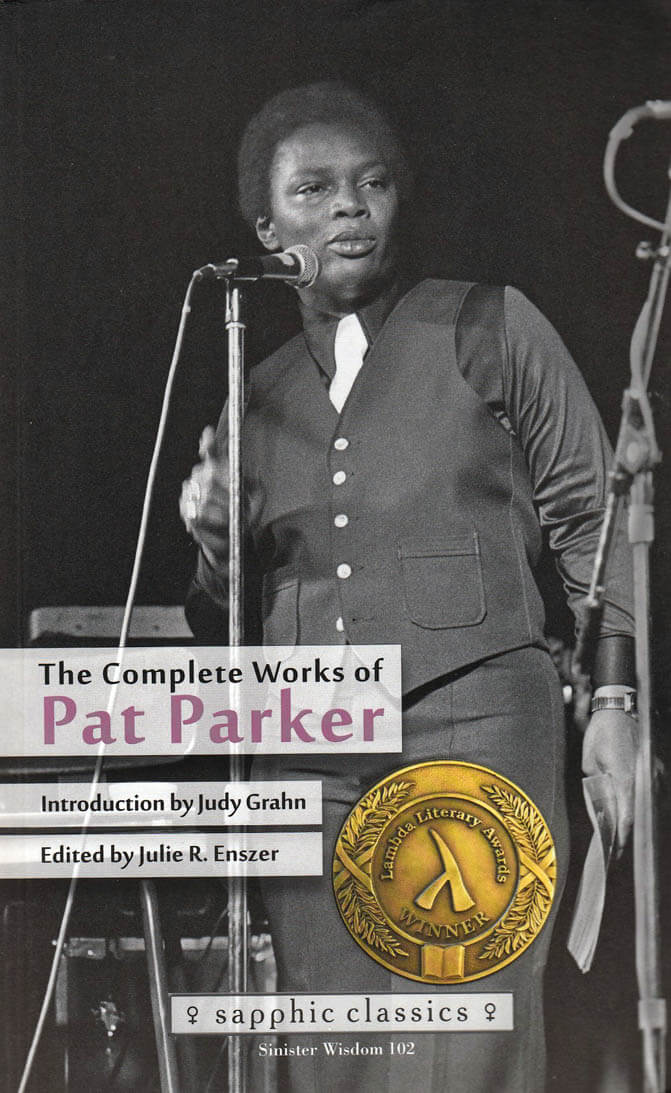
The Complete Works of Pat Parker
A Midsummer Night’s Press and Sinister Wisdom are pleased to announce the publication of Sinister Wisdom 102: The Complete Works of Pat Parker with a new introduction by poet and scholar Judy Grahn; an afterword by volume editor Julie R. Enszer, with extensive notes on the poems; photographs of Parker and a bibliography.
'In The Complete Works of Pat Parker, we have a trove of her artistic and political engagements-poetry and stories and plays and speeches; these are not separate realities. They intertwine in her now classic works, Movement in Black (1978), Womanslaughter (1978), and Jonestown & Other Madness (1985). But here too are less celebrated and uncollected works, plays especially, that show off Parker’s willingness to experiment, to push us towards more politicized realities.' - Alexis de Veaux
Included in Sinister Wisdom 102: The Complete Works of Pat Parker are Parker’s masterwork, Movement in Black, as well as Jonestown & other madness. Parker’s prose writing is collected in The Complete Works along with two unpublished plays and a number of previously uncollected poems. Editor Julie R. Enszer notes, “The breadth of creative output collected here demonstrates the seriousness of Parker’s overall work as a writer. Beginning in 1963, when she was nineteen years old, and continuing until she died in 1989, Parker took her work as a writer seriously. Gathering as much of it as possible into a single volume invites readers to take it seriously as well.”

March
March brings together poems and performance texts by Nathalie Rozanes, as well as a conversation with Elizabeth Ward and Tarek Halaby.
'Maybe I have never made a performance that was not about identification and its complexity. About positioning oneself. Maybe I have never made a piece that is not about how one thing leads to another. Maybe I have never made a piece that is not about process. (...)'
Published May 2020.

All That Beauty
A pathbreaking new volume of poems from Fred Moten, All That Beauty combine's Moten's penchant for lyrical prosody, radical thought, and African American theory to produce writing unlike any other poetry in the world: "What is it to reside without settling? Is that is or is that ain't like being stuck in sweetness, held in life?"
"The line between Fred Moten’s theory and poetry is increasingly cloudy; the distinction almost seems (but isn’t quite) irrelevant. In All That Beauty, his new poetry collection, the poems come closer than ever before to the capacious, disorienting density of his prose writing: not just for their hairpin turns of speculative reasoning, or even their gleeful embrace of specialized academic terminology, but because they are strewn with names, citations and allusions that situate the text in a range of discourses – from Black studies to sound studies to the philosophy of maths." —Steven Zultanski
(Published 2019.)
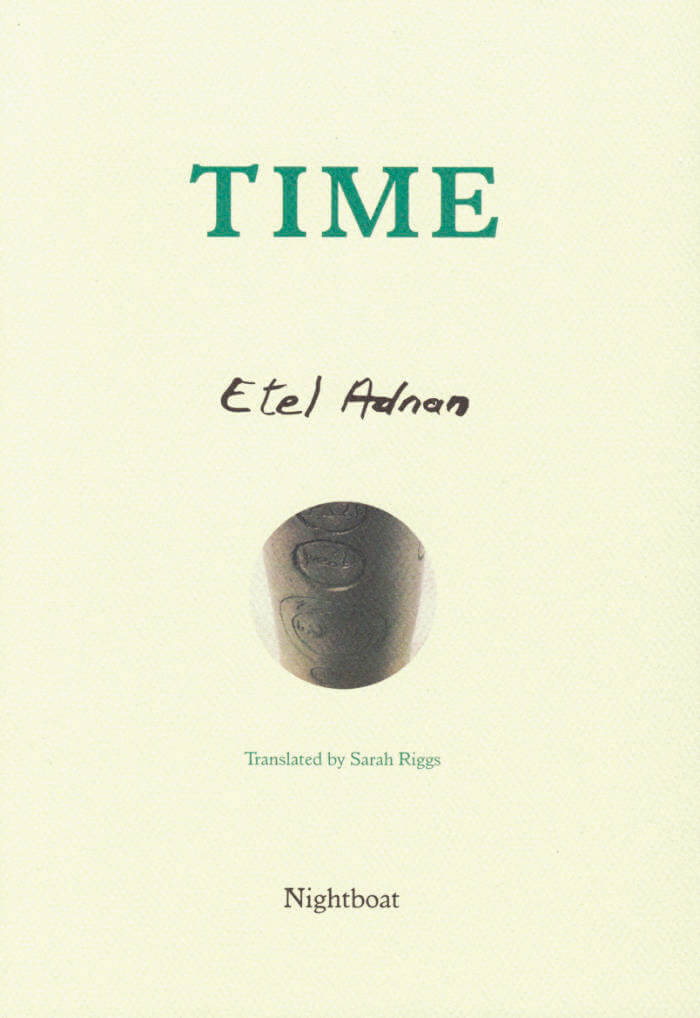
Time
On October 27, 2003, Etel Adnan received a postcard from poet Khaled Najar, who she had met in the late seventies. Originally in French, the poems it sparked collapse time, then expand it. War and love intertwine with coffee and bombs, memory and the present, evoking life in non- linear time.
Time continues Etel Adnan's recent series of short meditative works on single themes: Sea & Fog, Night, Surge and now Time, expanding her already rich philosophical and poetic lexicon. This book is a collection of six short works originally written in French.
(June 2019)
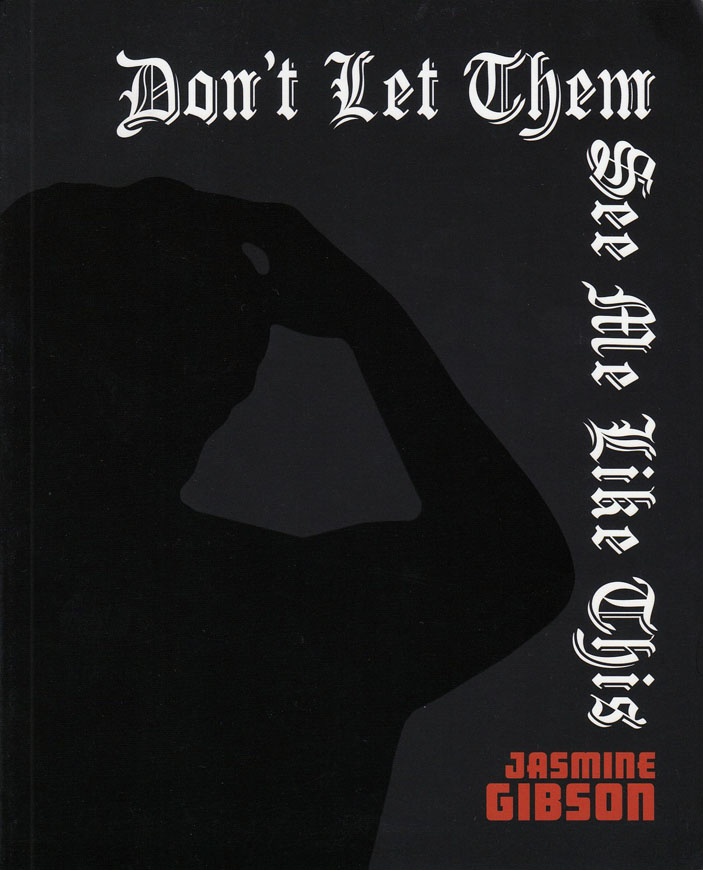
Don't Let Them See Me Like This
In Don't Let Them See Me Like This, Jasmine Gibson explores myriad intersectional identities in relation to The State, disease, love, sex, failure, and triumph. Speaking to those who feel disillusioned by both radical and banal spaces and inspired/informed by moments of political crisis: Hurricane Katrina, The Jena Six, the extrajudicial executions of Black people, and the periods of insurgency that erupted in response, this book acts as a synthesis of political life and poetic form.
JASMINE GIBSON is a Philly jawn based in Brooklyn. She spends her time thinking about sexy things like psychosis, desire, and freedom. She is the author of the chapbook Drapetomania.

The Black Condition Ft. Narcissus
The Black Condition ft. Narcissus is preemptive memoir, documenting the beginning of the author's gender transition and paralleling the inauguration of our latest Administration. These poems speak to and from fears holed up inside while contextualizing the cosmic impacts of our political landscape. Ranging from autobiographic melancholy to rigorously meditative, here is a necessary voice to process the world, predicated on unknowable desire and blossoming tragedy.
jayy dodd is a blxk trans femme from Los Angeles. They are a literary & performance artist. their work has appeared / will appear in Broadly, The Establishment, Entropy, LitHub, BOAAT Press, Duende, & The Poetry Foundation among others. they're the Workshops Director for Winter Tangerine, editor of A Portrait in Blues (Platypus Press 2017), author of Mannish Tongues (Platypus Press 2017) & The Black Condition ft. Narcissus (Nightboat Books 2019). their work has been featured in Teen Vogue & Entropy. they are also a volunteer gender-terrorist & artificial intellectual. find them talking trash online or taking a selfie.

Dear Angel of Death
Half poems, half prose, Dear Angel of Death braids intimate and public thinking about forms of togetherness. Is one woman a mother, a person in an artworld, a "black"? What imaginary and real spirits are her guides? The title essay proposes disinvestment in the idea of the Music as the highest form of what blackness "is" and includes many forms: philosophical divergence on the problem of folds for black life, a close reading of Nathaniel Mackey's neverending novel From a Broken Bottle Traces of Perfume Still Emanate, and an impassioned defense-cum-dismissal of contemporary hip hop's convergence with capitalism. - publishers note.
Simone White is the author of DEAR ANGEL OF DEATH (Ugly Duckling Presse), OF BEING DISPERSED (Futurepoem), and House Envy of All the World (Factory School), and the chapbooks Unrest (Ugly Duckling Presse) and Dolly (with Kim Thomas; Q Avenue). Recent poems and prose have appeared in BOMB, New York Times Book Review, Harper's, and Frieze. In 2017, she received the Whiting Award for poetry. She teaches at the University of Pennsylvania and lives in Brooklyn.
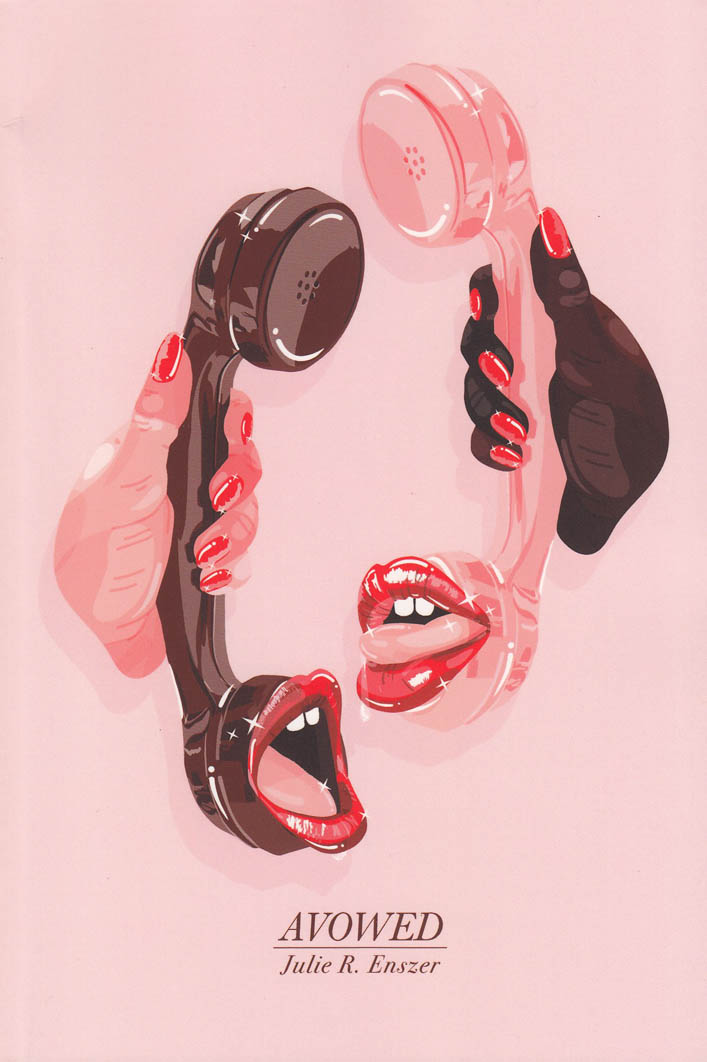
Avowed
The poems in Avowed explore aspects of a contemporary lesbian life within a committed relationship and as a citizen in the larger community. The narrator celebrates ("We break a glass. Mazel tov! We cry.") and mourns her losses ("Sometimes, between three and four a.m./on a break from her game/of bridge, your dead mother visits."). Riffing on Jewish liturgy, the feminist declares "everyday/I thank God/I was born a woman." Avowed delivers a complex, sustained vision of intimate partnership while celebrating the political changes that have secured LGBTQ visibility. - Robin Becker, author of Tiger Heron
'Avowed asks the critical question, "Is paper all that makes a marriage?" For the queer bride in a long-term relationship, the answer is as hard-won as the right to marry. Julie R. Enszer explores the bittersweet journey of a lesbian couple's struggle through the happily ever after with an edgy and humorous perspective that dares to share deep truths about desire, sex, and love. - Rigoberto GonzAlez, author of Unpeopled Eden
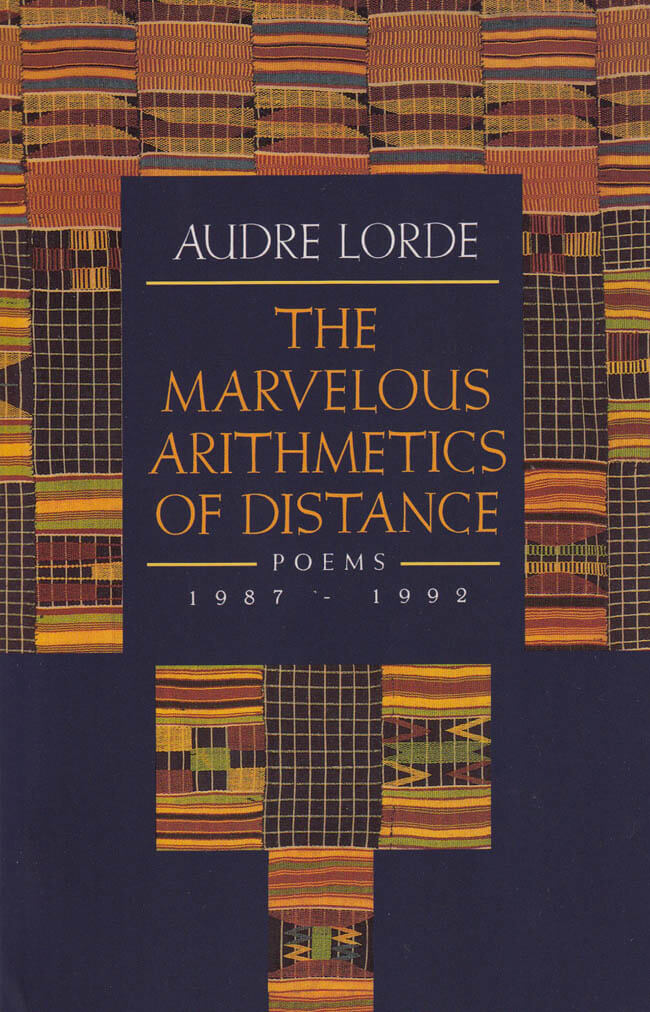
The Marvelous Arithmetics of Distance
This collection, 39 poems written between 1987 and 1992, is the final volume by "a major American poet whose concerns are international, and whose words have left their mark on many lives, in the words of Adrienne Rich.
Audre Lorde (1934-1992) was the author of ten volumes of poetry and five works of prose. She was named New York State Poet in 1991; her other honors include the Manhattan Borough President s Award for Excellence in the Arts. The Marvelous Arithmetics of Distance was nominated for a National Book Critics Circle Award in 1994."
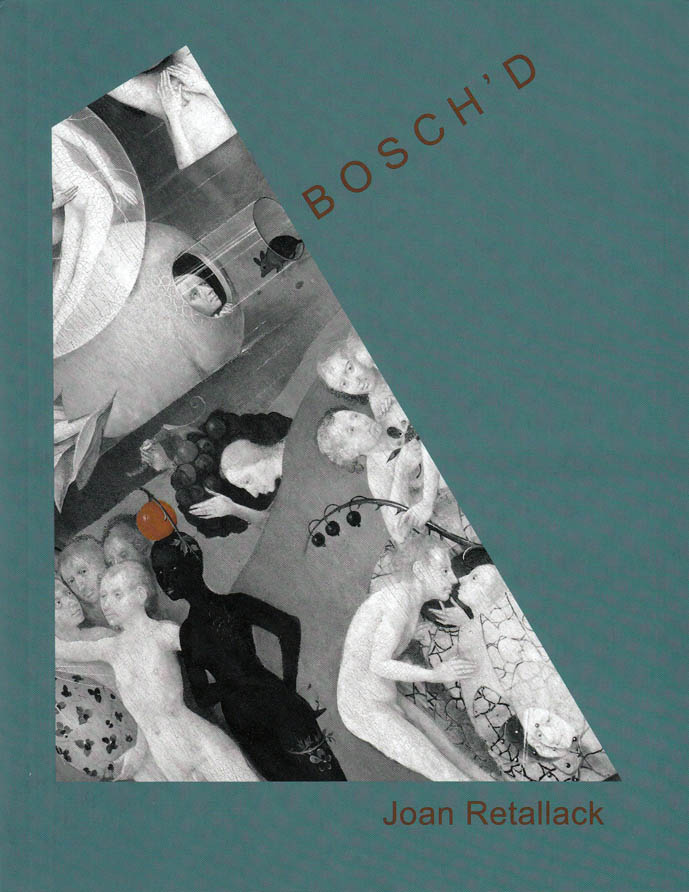
Bosch'd
Bosch'd spans space-time in a whimsical mix of poetry, quotation, fact, and insertion that all seems to point toward the dissolution of binary, the questioning of what's considered common knowledge, and how a poet works to enact change.
The first of many Bosch'd aphorisms states the opening condition this way: "Humor without gravitas passes through the mind with little effect; gravitas without humor is death." With that, Retallack takes on the paradoxical, hence generative, dystopian logics she calls "our projectile legacies"—misogyny, racism, undaunted colonialism, and more. It's where her playful and grave poetics of the poethical wager revs up. "As the sun at noon illustrates all shadows," Hieronymus Bosch illuminated a beautiful and grotesque biosphere (see Fig. x) that, along with tender sensuality and ubiquitous love, was riddled with human follies and trespasses we've come to identify as the Anthropocene. "Bosch'd" (verb. trans.) does not yet appear in our lexicons. For some of its implications, we present this erudite, searching, and great-humored book.
"This proliferation of angels, and angles, and spectra, and scenes, and singing is all but too beautifully blur to blurb. It defies its own collection. You have to ride, or hide, in an untied thought balloon to read it. It's so beautiful, with so much thought inside, and so loco, so such a little crazy in all its other languages, so off and errant but also so on the spot and dug in and garden'd, so unalone and shared and redshifted, so non-solo'd and so alter'd, that it becomes an altar, its music of alterity holding a delightful cultivation of flown that we can ground in, though it's also so nonlocal, so shar'd in the general speech, that even in the preparation of its table of contents, as if it were a piano on which bizarre things have been painted as the coming of froth, BOSCH'D blindsides despair. Who is Genre Tallique anyway? Bud Powell? An owl? Wow!"—Fred Moten

Word / World
Word/World is a book of three registers. The collections Alphabet Poems, Apples and Origins, and then the Word/World poems themselves, comprise the contents of this book. These three constitute a progression, through language, from the unruly, abstracted language of trauma, into a more integrated and embodied approach to a language that inhabits an awakened body in the present tense.
The fabric of Word/World spans heirloom seeds, police murders, witch burning, Ayahuasca tourism, shamanism, the asteroid Chiron, soul mates, alchemical principles, plant medicine, tantric sex, gangster rap and the end of American Apparel. It is an attempt to heal divisions and static states, and looks towards a world that exists outside of duality.
Building on the work of Morris’ first book, Word/World firmly establishes poetry as its own language, a language which borrows from but is not like other language, and in which ideas can be held, examined, questioned from different angles, and exploded.

Rabbit
The long-awaited third collection from one of the UK’s finest, most virtuosic of modern lyric poets. These poems take the reader on surprising journeys of healing, hard-won amid personal and social vicissitudes – including triumph over addiction, and alcoholism – and open spaces in which to share in emotional, quasi-spiritual transcendence despite. Who could ask for more? Rabbit was chosen for the PBS Wild Card Choice for Winter, 2018.
“When poetry is the centre of your life the strength of some poets will get fixed in the orbit of your day, their poems settled into the memory of mind and body. Sophie Robinson is one of my absolute favourites, her lines returning to me, visceral, unsettling, exacting, and stunning! If you read one book of poems this year, let it be this! She’s a gateway drug, keeping you wanting all books of poetry to be as genius to make part of your waking life.”
– CA Conrad, author of While Standing in Line for Death.
Sophie Robinson teaches Creative Writing at the University of East Anglia and is the author of A and The Institute of Our Love in Disrepair. Recent work has appeared in n+1, The White Review, Poetry Review, The Brooklyn Rail, Ploughshares, BOMB Magazine, and Granta.

Wretched Strangers
In response to surges of violent British nationalism and political paranoia around borders, and to related social and ethical crises, JT Welsch and Ágnes Lehóczky have assembled an anthology to mark the vital contribution of non-UK-born writers to this country’s poetry culture. Wretched Strangers brings together innovative writing from around the globe, celebrating the irreducible diversity such work brings to ‘British’ poetry. While documenting the challenges faced by writers from elsewhere, these pieces offer hopeful re-conceptions of ‘shared foreignness’ as Lila Matsumoto describes it, and the ‘peculiar state of exiled human,’ in Fawzi Karim’s words.
The book is published by Boiler House Press to commemorate the anniversary of the June 2016 EU Referendum and in solidarity through struggles ongoing and to come. Proceeds will be donated to charities fighting for the rights of refugees.
Alireza Abiz • Astrid Alben • Tim Atkins • Andre Bagoo • Veronica Barnsley • Khairani Barokka • Leire Barrera-Medrano • Katherine E. Bash • Áine Belton • Caroline Bergvall • Sujata Bhatt • Rachel Blau DuPlessis • Fióna Bolger • Ben Borek • Andrea Brady • Serena Braida • Wilson Bueno • James Byrne • Kimberly Campanello • J.R. Carpenter • Mary Jean Chan • che • Matthew Cheeseman • Iris Colomb • Giovanna Coppola • Anne Laure Coxam • Sara Crangle • Emily Critchley • Ailbhe Darcy • Nia Davies • Tim Dooley • Benjamin Dorey • Angelina D’Roza • Katherine Ebury • Dan Eltringham • Ruth Fainlight • Kit Fan • León Felipe • Alicia Fernández • Veronica Fibisan • Steven J Fowler • Livia Franchini • Ulli Freer • Anastasia Freygang • Kit Fryatt • Monika Genova • Geoff Gilbert • Peter Gizzi • Chris Gutkind • Cory Hanafin • Edmund Hardy • David Herd • Jeff Hilson • Áilbhe Hines • Alex Houen • Anthony Howell • Nasser Hussain • Zainab Ismail • Maria Jastrzębska • Lisa Jeschke • Evan Jones • Loma Sylvana Jones • Maria Kardel • Fawzi Karim • Kapka Kassabova • Özgecan Kesici • Mimi Khalvati • Robert Kiely • Michael Kindellan • Igor Klikovac • Ágnes Lehóczky • Éireann Lorsung • Patrick Loughnane • John McAuliffe • Aodán McCardle • Niall McDevitt • Luke McMullan • Christodoulos Makris • Ethel Maqeda • Lila Matsumoto • Luna Montenegro • Stephen Mooney • Ghazal Mosadeq • Erín Moure • Vivek Narayanan • Cristina Navazo-Eguía Newton • Alice Notley • Terry O’Connor • Wanda O’Connor • Gizem Okulu • Claire Orchard • Daniele Pantano • Astra Papachristodoulou • Fani Papageorgiou • Richard Parker • Sandeep Parmar • Albert Pellicer • Pascale Petit • Adam Piette • Jèssica Pujol Duran • Alonso Quesada • Ariadne Radi Cor • Nat Raha • Nisha Ramayya • Peter Robinson • William Rowe • Lisa Samuels • Jaya Savige • Ana Seferovic • Sophie Seita • Seni Seneviratne • Timea Sipos • Zoë Skoulding • Irene Solà • Samuel Solomon • Agnieszka Studzinska • James Sutherland-Smith • George Szirtes • Rebecca Tamás • Harriet Tarlo • Shirin Teifouri • Virna Teixeira • David Toms • Sara Torres • Kinga Toth • Claire Trévien • David Troupes • Arto Vaun • Juha Virtanen • J. T. Welsch • David Wheatley • Elżbieta Wójcik-Leese • Jennifer Wong • Isaac Xubín • Jane Yeh

This Container 08
Stefan Govaart, Maia Means and 1 more
Bringing together thirty authors variously invested in dance, performance and/or choreography; This Container is a zine for texts produced through and alongside dance, performance and choreography. Some write more than dance; others dance more than write. Some practice choreography explicitly; others implicitly. However varied the authors gathered here may be, the expansive field of performance produces all kinds of texts that deserve public recognition, a readership, and an infrastructure for feedback and editing. This issue is another attempt at making this possible.
With contributions by: Paula Almiron, Jani Anders Purhonen, Simon Asencio, Mélanie Blaison, Oda Brekke, Juan Pablo Cámara, Laura Cemin, Matt Cornell, Stina Ehn, Emma Fishwick, Lucija Grbic, Sara Gebran, Andreas Haglund, Hugo Hedberg, Alice Heyward, Madlen Hirtentreu, Eleanor Ivory Weber, Nikima Jagudajev, Sonjis Laine, Yoojin Lee, Denise Lim, Theo Livesey, Naya Moll, Caterina Mora, Rhiannon Newton, Zander Porter, Lena Schwingshandl and Stav Yeini.
Since its inception, This Container has hoped to contribute to a feminist lineage of textual production. What constitutes this lineage? This is a vast question. The beginning of an answer might start by saying something about genre. If , as Lauren Berlant writes, genre is an “aesthetic structure of affective expectation”, a “formalization of aesthetic or emotional conventionalities”, then genre crafts expectation by pointing to what is recognizable in form.1 If feminism is about wanting the world to be otherwise, the multiplication of genres inducing the multiplication of (imagined) stories helps to recraft expectation toward a less oppressive, less boring, and more just world. Feminist work includes genre work. Poetry, diary, diagram, notes, recipe, critique, the sound file, the epistolary, the essay, the art project: they have all found their way in, sculpting a diverse set of readerly structures of affective expectation. They are to shift your worldly expectations.
More info at http://www.thiscontainer.com
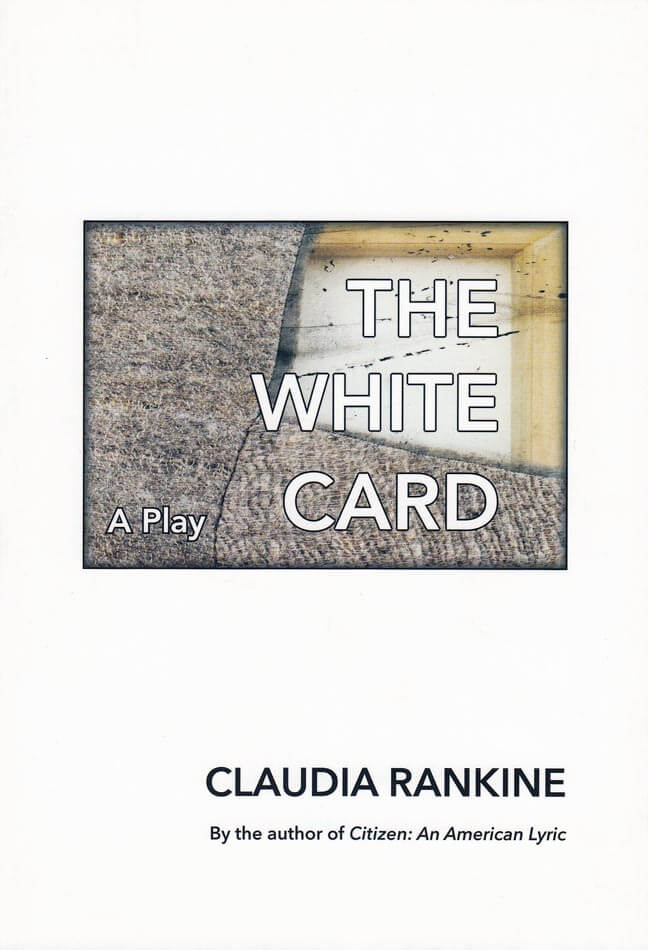
The White Card: A Play
The White Card stages a conversation that is both informed and derailed by the black/white American drama. The scenes in this one-act play, for all the characters' disagreements, stalemates, and seeming impasses, explore what happens if one is willing to stay in the room when it is painful to bear the pressure to listen and the obligation to respond.
—from the introduction by Claudia Rankine
Claudia Rankine's first published play, The White Card, poses the essential question: Can American society progress if whiteness remains invisible?
Composed of two scenes, the play opens with a dinner party thrown by Virginia and Charles, an influential Manhattan couple, for the up-and-coming artist Charlotte. Their conversation about art and representations of race spirals toward the devastation of Virginia and Charles's intentions. One year later, the second scene brings Charlotte and Charles into the artist's studio, and their confrontation raises both the stakes and the questions of what—and who—is actually on display.
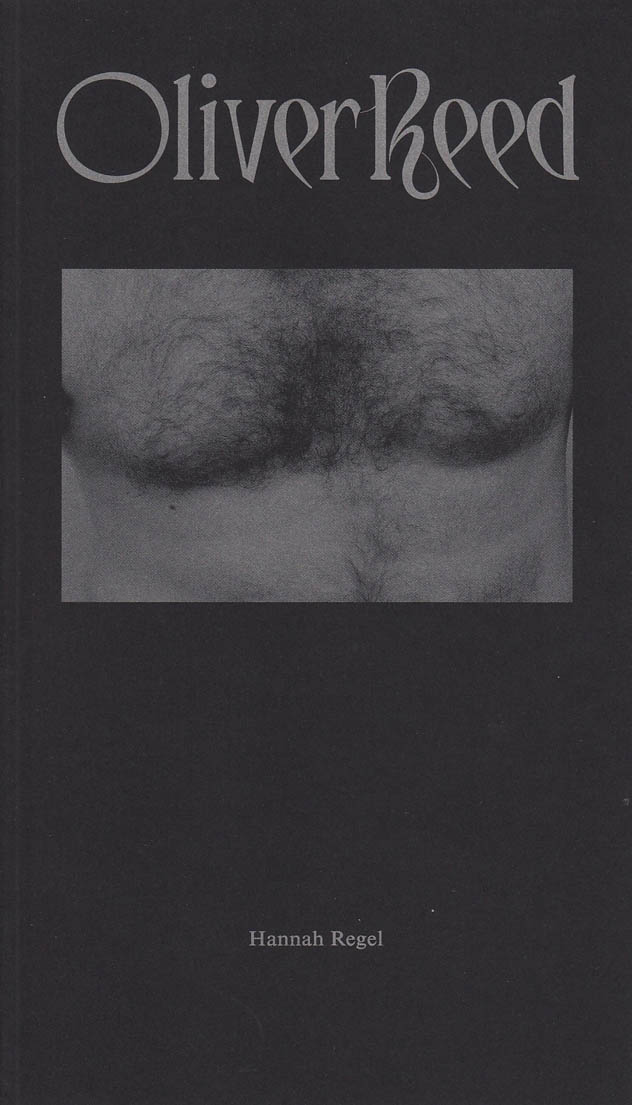
Oliver Reed
In Hannah Regel’s brilliant collection, Oliver Reed, the figure of the horse becomes an object for language’s brutality and the all too familiar subjugation of women’s voices, bodies, and labour. An impressive hyperbolic pastiche of pleasurable misbehavior guides a girl named Sorry through her own undoing while naming new tools for calculated resistance. ‘Kill the language. Kill it. Get the shovel. We’re making a belt.’ I would gladly do whatever she tells me to do and wouldn’t think of doing otherwise. Regel creates a new order for the ecstatic wreckage of obedience.
– Cassandra Troyan, author of Blacken Me Blacken Me, Growled
Regel doesn’t really sound like anyone. Oliver Reed introduces a poetic sensibility that seems as at odds with convention as it is equal to the moment: fully formed, virtuosic, kind of lethal. These are pitiless, discomforting poems that explore our own creatureliness with a deadly curiosity. Each is a transformation: the actor becomes a strange muse and guiding presence, to ‘smoulder a mobile furnace’; the horse, another of the book’s recurring figures, becomes more than an emblem of eros, labour and suffering; the young girl’s bratty insolence turns defiant and stricken. The voice wills these changes into being even as she ‘wills herself barren’. As much as they trouble and seduce, the poems are also watchful, vigilant – they seem to offer a means of protection. Oliver Reed is an astonishing, masterful first book.
– Sam Riviere, author of 81 Austerities
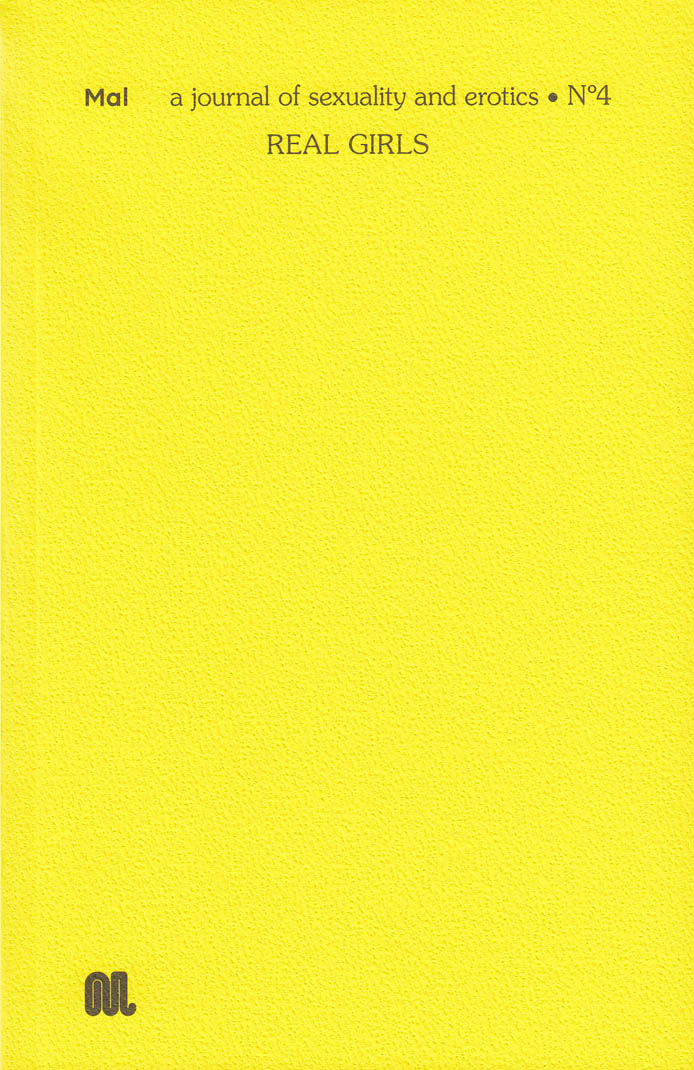
MAL, Nº 4: Real Girls
Kathryn Maris, Maria Dimitrova
On projection in three stories, four poems and a sequence of poems. Featuring illustrations by Birdie Hall.
First published: October 2019
This issue of Mal Journal considers projection, transgression and adolescence, bringing together texts that challenge received notions of innocence and moral reasoning. It features new fiction by Chris Kraus, Luke Brown and Natasha Stagg, poetry by Rachel Long and a sequence of poems by Sasha Dugdale.
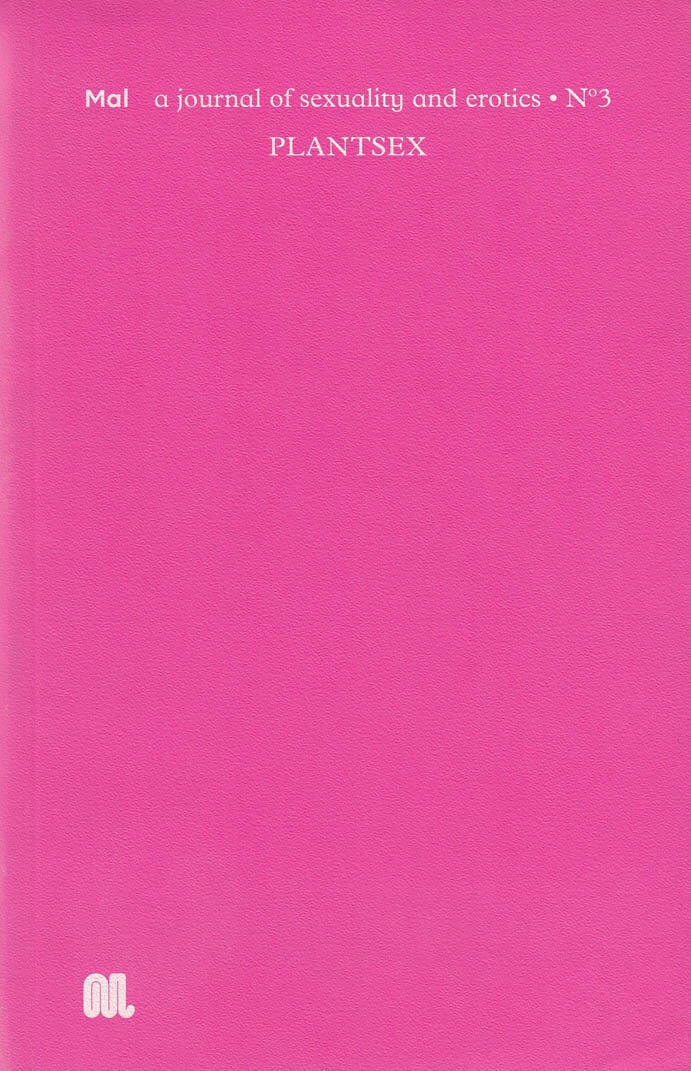
MAL, Nº 3: PLANTSEX
Kathryn Maris, Maria Dimitrova
On botany and eroticism in twelve essays, stories and poems. Published in collaboration with Serpentine Galleries.
First published: April 2019.
This issue of Mal Journal features an essay by Chloe Aridjis on Mexican flora and its foreigners, a sequence of poems by Bhanu Kapil, an essay on the sex lives of plants by Emanuele Coccia, a sci-fi story by artist Victoria Sin, a personal exploration of the queerness of gardening by Julia Bell, an essay on queer botanics by film critic Teresa Castro, a sequence of botanical nursery rhymes and artworks by artist, poet and gardener Alex Cecchetti, a new poem (and somatic poetry ritual) by CAConrad, an essay by writer and poet Daisy Lafarge asking ‘Can you be a revolutionary & still love flowers?’, excerpts from the Song of Songs and Ovid's Fasti V and Metamorphoses, and illustrations by Australian artist Yi Xiao Chen.
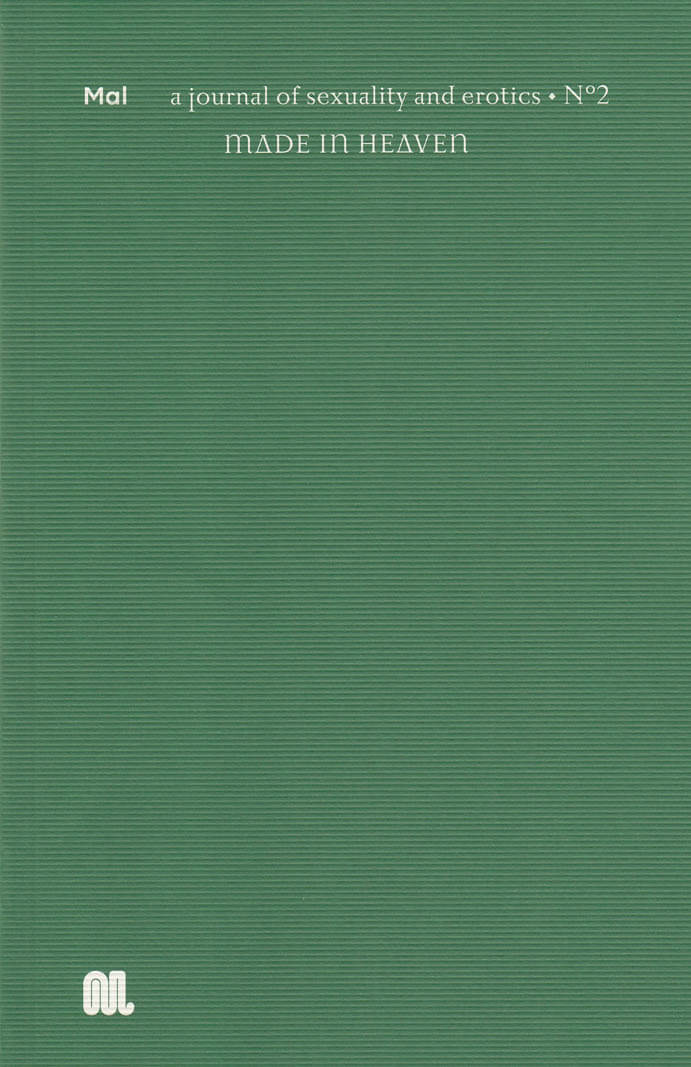
MAL, Nº 2: Made in Heaven
Kathryn Maris, Maria Dimitrova
On transcendence in two essays, a short story and four poems. Featuring illustrations by Franz Lang.
First published January 2019.
This issue of Mal features Fiona Alison Duncan on a legal case interrogating the blurred lines between sex work and spiritual practice, a personal essay on trans pleasure by Gabrielle Bellot, a short story on the volatility of mortal love by Sheila Heti and a series of poems by Mary Ruefle.